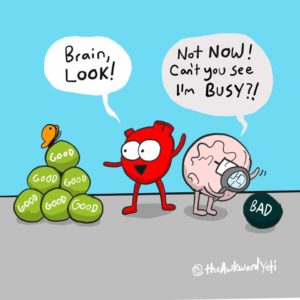One of my least favorite terms that people overuse is the word “natural.” From yogis who refuse anything that might come from a pharmacist’s office, to vegans, omnivores, and paleos alike arguing over each other about what constitutes a “natural” diet, to nonmonogamous communities advocating for more bonobo-like lifestyles, or Christians espousing homosexuality as a sin because it is not “natural” for “one man to lyeth with another,” everyone seems to have their own idea about what is natural or unnatural.
There are a lot of problems with any line of reasoning that says a certain way of life is a “natural” way of being. The first issue is that it creates an artificial bifurcation of humanity and basically everything else. Humanity did not arise from nothing; we came from nature, and we are also a part of nature. When we die, our bodies will return to nature. One could easily argue that anything humanity creates, whether it is air conditioning, antibiotics, or a mocha cappuccino, is quite natural, too.
But the biggest problem with arguing that any kind of life is more natural is this: just because something is natural, that does not mean it is good or better.
Don’t think natural; think good
Natural disasters, snake venom, poison ivy, and yes, even COVID, are all “natural.” Dying during childbirth or from smallpox are also quite natural. There are thousands of deadly toxic chemicals in many very natural plants, which are about a million times worse for you than an ibuprofen (which is relatively harmless in small quantities).
Also, humans love to justify terrible things that they do by saying it is the natural way of things. For centuries, slavery and sexism was also justified as a kind of natural order.
So the question should not be whether a certain activity is natural or not, but whether it is a good activity, wanted by society. Is it something we want to practice and encourage? Does the action reflect our deepest values?
Take the vegetarian/omnivore/paleo dilemma, for example. Is it natural for humans to eat meat? Probably. But do we want humans to eat meat? Is our meat industrial complex ethical? Is it right to kill 50 billion chickens a year for the survival of our species? Is it sustainable for 10 billion humans to be killing and eating animals year after year on a planet with limited and decreasing resources?
Similarly, it may be “natural” for human beings to murder other human beings. Looking at human history, we do seem to have a strong habit of killing each other, so perhaps it seems like a very natural thing to do. In fact, when you look at nature itself, you see all sorts of examples of genocide, infanticide, and even rape.
Rather than focusing on what is or isn’t natural, we have to focus truly on what matters. We must look deep into our hearts, find our deepest values, and make sure we are living fully in line with our truth.
And, when we do finally look within, we see that a number of our evolutionary tendencies, in fact, do not align with our deepest values and what we truly want in life. In fact, there are numerous mental, emotional, and behavioral modes in our genetics that run contrary to our own desires to feel fulfilled, to be happy, and to love each other.
In order to have long-lasting and intimate relationships; in order to be happy; and in order for the planet to survive, we must recognize these biases within ourselves so that we can overcome them.
In this post, I would like to look at just two examples of biases and functions in our minds that actually get in the way of living in peace, happiness, and harmony. These examples are our mind’s negativity bias and in-group bias.
Example 1: Our mind’s negativity bias
One of the first things we need to understand about our minds is that they have very strong negativity biases. These biases are so prominent that, if every human being was given an instruction manual, there would be a big warning at the top that says, Warning: Your negativity bias will get in the way of your happiness.
Our mind’s negativity bias is its tendency to focus on, emphasize, and better remember experiences that are more negative. As the saying goes, the mind is Velcro for the bad stuff in our lives, and Teflon for the good.

Our negativity bias is quite natural. It is also problematic. We might give a speech to a hundred people, and, afterwards, a dozen people could tell us, “Wow, that was a really moving speech. Thank you so much,” but then we might overhear one person saying, “I thought the speech was just OK.” Most likely, when we go to sleep that night, we will be thinking about that one person and that one piece of negative feedback.
Thousands of years ago, when we were creatures rummaging for food in the forest, negativity bias was extraordinarily helpful. If we got a drink of water from a certain pond and an alligator tried to eat us, it greatly served our survival if we distinctly remembered where that alligator was.
Similarly, we have a natural tendency to create false positives: where a threat is imagined, but doesn’t actually exist. If, in the wild, we heard a rustling of grass behind us, it would serve us to assume it was a dangerous predator rather than to just assume it was a small bird. Our assumption would greatly serve us the 1% of the time it actually was a predator.
So, while our negativity bias served us thousands of years ago, today, it rarely helps. No longer are predators trying to attack us, and no longer do we need to scan our environments for threats. Instead, we just want to be happy and not live in constant fear. We do not want to imagine threats that are not actually there.
So we must overcome the mind’s natural negativity bias if we want to be happy, and a great way to do this is by intentionally cultivating gratitude. By practicing gratitude, we literally rewire the brain to focus more on the positive and to dwell less on the negative.
This can be done with a gratitude journal, or just by thinking about things that you appreciate about your partner or your life.
For more on cultivating positive mental states, check out: We Are in a Judgment Epidemic and No One Is Talking About It
Example 2: Our in-group bias
Another natural bias we have is known as an in-group bias. This tendency is incredibly pernicious, ubiquitous, and responsible for so much suffering in the world; that’s why it is important for every human being to understand this tendency.
Sometimes called “in-group favoritism” or “intergroup bias,” our in-group bias is a pattern of favoring members of one’s “in-group” over “out-group” members. While you might think of a couple groups you feel you are a part of, the mind unconsciously creates dozens of in-groups and out-groups quite easily, like in the comic below.

Our in-group bias is much more pernicious than just sports teams, however. Politicians will manipulate our “us vs. them” tendency to dehumanize their opposition. Entire societal systems have been put in place throughout history to divide groups by class, gender, race, sexuality, nationality, and religion.
So our in-group bias then is not just a harmless sports team rivalry. It can manifest as sexism and slavery, as war and genocide. It is the essence behind tribalism, behind any group of people who only think for themselves, leading to violence against and hatred for another group.
That is because, once we decide (or our cultural conditioning decides) what groups we are considered to be in, our ability to empathize with the out-group decreases. Our ability to see from another person’s point of view, or even to consider the other group human, decreases.
We can also apply our in-group bias to how we separate humanity as being better than the natural world. We say that animals are less than us, so we deserve to eat them, without considering that they deserve the same right to life as we do.
Once we recognize our mind’s habitual tendencies, we have to intentionally cultivate the opposite. In the case of negativity bias, this means cultivating gratitude. In the case of our in-group bias, we have to cultivate empathy and compassion for others, recognizing our interconnectedness with others and seeing our connections with all things.
This is done by combining our attention and our intention. One easy way to understand our interconnectedness is just by paying attention to the present moment. Simply listen to your breath, feel how all the plants on Earth contribute to the oxygen that you breathe. By paying attention to each other, we can learn to see the world from their perspective, increasing our capacity for empathy and understanding.
And, by continually returning to our intention to cultivate connection, the connection gets stronger. We see how our biases are arbitrary, and how we are not different races or genders or nationalities, but one human race on one planet, sharing this one life.
For more on overcoming in-group bias, check out: The Most Important Thing We Can Do Right Now
The Power of Antidotes
So far, I have listed just two of the mind’s behavioral tendencies. There are, of course, many more. Fortunately, you do not have to know them all. You simply have to cultivate their opposites to attain what really matters most in life: peace, love, and happiness.
This is why the spiritual path of love is one we should all be walking; we have to evolve beyond the cards we have been dealt. This is the evolution of our consciousness, finding a love beyond our own selves, beyond the familial, beyond the national–that includes the whole world. A world that includes human rights for all and the unconditional acceptance of all beings, creating a love that is rooted in the greater cosmos and encompasses all beings everywhere.
There will be many obstacles along the way, including people and systems that have yet to evolve from our more natural, tribalistic tendencies. There will be naysayers, held back by their own negativity biases, who see nothing but obstacles.
Fortunately there will always be hope for a brighter future because of those with the courage to face these challenges and their own biases in order to create a world where we can all live in peace and harmony.








